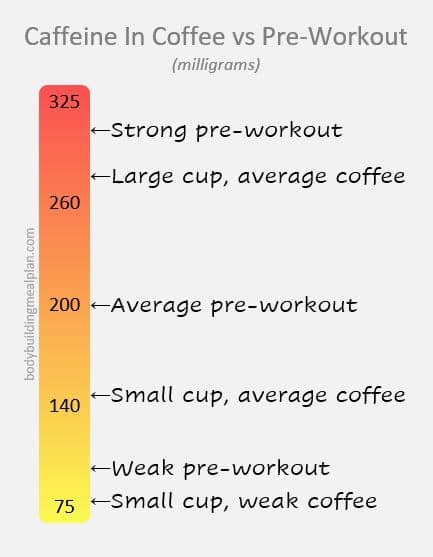Have you ever found yourself struggling to wake up in the morning? Maybe you rely on that strong cup of coffee to kickstart your energy levels. But what if I told you that there might be an alternative? Have you ever considered using pre-workout supplements to wake you up instead?
If you’re unfamiliar with pre-workout supplements, they are typically taken before a workout to enhance energy, focus, and endurance. These supplements often contain ingredients like caffeine, creatine, and B vitamins that can provide an energy boost. But can they really wake you up in the same way that a cup of coffee does? In this article, we’ll delve into the details and explore whether pre-workout supplements can be a viable substitute for your morning cup of joe.
Stay tuned to discover the science behind pre-workout supplements and their potential as a morning pick-me-up. Whether you’re a fitness enthusiast or just looking for a different way to start your day, you won’t want to miss out on the fascinating information we’ll uncover. So let’s dive in and find out if pre-workout can truly wake you up instead of coffee!
What is pre-workout?
Definition and purpose of pre-workout
Pre-workout supplements are commonly used by individuals to enhance their performance during workouts. These supplements usually come in powder or pill form and are taken before exercising to boost energy levels, improve focus, and increase endurance. They typically contain a variety of ingredients that are known to stimulate the central nervous system and provide an extra energy kick.
Common ingredients in pre-workout supplements
Pre-workout supplements often contain ingredients such as caffeine, creatine, beta-alanine, and branched-chain amino acids (BCAAs). These substances work together to provide a range of benefits, including increased energy, enhanced focus, and improved muscle recovery. It is important to note that the specific ingredients and their dosages can vary between different pre-workout products.
How does pre-workout affect the body?
Stimulation of the central nervous system
One of the primary effects of pre-workout supplements is the stimulation of the central nervous system. This is mainly due to the presence of caffeine in most pre-workout formulas. Caffeine acts as a stimulant, increasing alertness and reducing fatigue. It can also enhance cognitive function and improve reaction times, which can be beneficial during intense physical activity.
Increase in energy levels
Pre-workout supplements are designed to provide a temporary increase in energy levels, allowing individuals to train harder and for longer periods of time. The combination of ingredients in these supplements, particularly caffeine, helps to increase metabolic rate and promote the release of stored energy. This can result in improved performance and a more intense workout.
Enhancement of focus and alertness
In addition to boosting energy levels, pre-workout supplements can also enhance focus and alertness. Key ingredients like caffeine and BCAAs have been shown to improve cognitive function and mental clarity. This can be particularly beneficial during workouts that require concentration and precision, such as weightlifting or high-intensity interval training.

Comparison between pre-workout and coffee
Effects on wakefulness and alertness
Both pre-workout supplements and coffee can provide a wakefulness effect due to the presence of caffeine. However, the concentration of caffeine in pre-workout supplements is often higher than that in a cup of coffee. This means that pre-workout supplements may offer a more pronounced wakefulness effect, potentially making them a more suitable choice for individuals who require a significant energy boost.
Difference in energy boost
While both pre-workout supplements and coffee can deliver an energy boost, the effects may differ. Pre-workout supplements are specifically formulated to provide sustained energy throughout a workout, which can be beneficial for individuals engaging in intense physical activity. Coffee, on the other hand, may provide a more immediate and short-lived burst of energy.
Impact on caffeine tolerance
Regular consumption of coffee can lead to caffeine tolerance in some individuals. This means that over time, the same amount of caffeine may have less of an effect on wakefulness and alertness. Pre-workout supplements, however, often contain higher doses of caffeine, which may temporarily override tolerance and provide a more significant energy boost.
Advantages of using pre-workout instead of coffee
Extended energy and endurance for workouts
One of the main advantages of using pre-workout supplements instead of coffee is the extended energy and endurance they can provide during workouts. The specific combination of ingredients in pre-workout products, such as caffeine, creatine, and BCAAs, work together to enhance physical performance and delay fatigue. This can result in more productive and effective training sessions.
Specific benefits for athletes and fitness enthusiasts
Pre-workout supplements are often designed with the specific needs of athletes and fitness enthusiasts in mind. They can target areas such as muscle growth, recovery, and strength development. Coffee, while providing a temporary energy boost, does not offer these additional benefits. Therefore, individuals looking to optimize their training and achieve specific fitness goals may find pre-workout supplements more suitable.
Ability to customize ingredients and dosages
Another advantage of pre-workout supplements is the ability to customize the ingredients and dosages according to individual preferences and goals. Coffee, on the other hand, offers little flexibility in terms of adjusting its composition. Pre-workout products come in a range of formulas, allowing users to choose the specific ingredients that best meet their needs, be it energy, focus, or muscle recovery.

Disadvantages of using pre-workout instead of coffee
Potential side effects and health risks
Pre-workout supplements, particularly those containing high doses of caffeine and stimulants, can have potential side effects and health risks. These can include increased heart rate, elevated blood pressure, anxiety, and digestive issues. It is important to read labels carefully and consult with a healthcare professional before using pre-workout supplements, especially if you have pre-existing medical conditions or are sensitive to caffeine.
Dependency and withdrawal symptoms
Regular use of pre-workout supplements can lead to dependency and potential withdrawal symptoms when discontinuing use. The body can become accustomed to the effects of the ingredients, particularly caffeine, and may require increasing dosages to achieve the same results over time. This can lead to a reliance on pre-workout supplements for energy and performance, which may not be desirable for long-term health.
Limited long-term studies on safety and efficacy
While pre-workout supplements have gained popularity in recent years, there is still a lack of long-term studies on their safety and efficacy. Many of the studies conducted have focused on short-term effects and specific ingredients rather than the overall impact of these supplements on health. Therefore, the long-term consequences of regular pre-workout use are still relatively unknown.
How to choose the right pre-workout supplement
Consideration of personal fitness goals
When choosing a pre-workout supplement, it is important to consider your personal fitness goals. Different products are formulated to target specific areas, such as energy, muscle growth, or endurance. By identifying your specific goals, you can select a pre-workout supplement that best aligns with your needs.
Evaluation of ingredient profiles
Before purchasing a pre-workout supplement, it is essential to evaluate the ingredient profiles. Look for products that contain high-quality ingredients and avoid those that contain excessive amounts of stimulants or potentially harmful substances. It may also be helpful to research specific ingredients to understand their potential benefits and any associated risks.
Checking for third-party testing and certifications
To ensure the quality and safety of a pre-workout supplement, check for third-party testing and certifications. These certifications can provide assurance that the product has undergone rigorous testing for purity, potency, and safety. Examples of reputable certifications include NSF Certified for Sport, Informed-Sport, and USP Verified.

Tips for consuming pre-workout for wakefulness
Timing and dosage recommendations
To maximize the wakefulness effect of pre-workout supplements, it is important to follow timing and dosage recommendations. Most pre-workout products suggest consuming them approximately 30 minutes before starting your workout. Start with the lowest recommended dosage and gradually increase if needed, while still staying within the recommended limits.
Combining pre-workout with other wakefulness strategies
In addition to consuming pre-workout supplements, you can enhance wakefulness by incorporating other strategies. These can include getting sufficient sleep, maintaining a balanced diet, staying hydrated, and engaging in stress-reducing activities. Combining these strategies with pre-workout supplements can provide a synergistic effect and enhance overall wakefulness.
Monitoring caffeine intake from other sources
When consuming pre-workout supplements for wakefulness, it is essential to monitor your caffeine intake from other sources, such as coffee, tea, energy drinks, or chocolate. Excessive caffeine consumption can lead to side effects like jitteriness, increased heart rate, and sleep disturbances. Be mindful of your overall caffeine intake to avoid potential negative effects.
Alternatives to pre-workout and coffee
Natural energy-boosting foods and drinks
If you prefer to avoid pre-workout supplements and coffee, there are several natural alternatives that can provide an energy boost. These can include foods like bananas, nuts, seeds, and whole grains, which are rich in nutrients and provide sustained energy. Additionally, herbal teas like ginseng tea or green tea can offer a mild energy lift without the additional stimulants.
Other supplements for wakefulness and performance enhancement
Aside from pre-workout supplements, there are other supplements available that can enhance wakefulness and performance. These include adaptogens like ashwagandha or Rhodiola rosea, which help the body adapt to stress and improve cognitive function. Additionally, omega-3 fatty acids and vitamin B12 supplements have been shown to support energy production and mental alertness.
Healthy lifestyle habits for sustained energy
While supplements and food can provide a temporary energy boost, maintaining overall healthy lifestyle habits is crucial for sustained energy throughout the day. Regular exercise, a balanced diet, adequate sleep, stress management, and hydration all contribute to enhanced wakefulness and overall well-being. Incorporating these habits into your daily routine can help you maintain energy levels without relying solely on pre-workout supplements or coffee.

Precautions and considerations
Consultation with a healthcare professional
Before starting any new supplement regimen, it is always advisable to consult with a healthcare professional, especially if you have pre-existing medical conditions or are taking medications. They can provide personalized advice based on your specific needs and help identify any potential risks or interactions.
Understanding individual caffeine sensitivity
Individuals may have different levels of sensitivity to caffeine, which can influence its effects on wakefulness and alertness. It is important to be aware of your own tolerance and response to caffeine and adjust your consumption accordingly. Experiment with different products and dosages to find the right balance for your needs.
Avoidance of excessive or dangerous consumption
Lastly, it is crucial to avoid excessive or dangerous consumption of pre-workout supplements or any other caffeinated products. Stick to recommended dosages and avoid exceeding the daily safe caffeine intake limit, which is generally considered to be around 400mg for most adults. High doses of caffeine can lead to adverse effects and potentially harm your health.
Conclusion
When it comes to waking you up, pre-workout supplements can be a viable alternative to coffee. They provide an extended energy boost, enhance focus and alertness, and offer specific benefits for athletes and fitness enthusiasts.
However, it is important to weigh the advantages against potential disadvantages, such as side effects, dependency, and a lack of long-term studies on safety. Choosing the right pre-workout supplement involves considering personal fitness goals, evaluating ingredient profiles, and checking for third-party testing and certifications.
It is also essential to follow recommended dosages, combine pre-workout with other wakefulness strategies, and monitor overall caffeine intake. Ultimately, the decision to use pre-workout instead of coffee is a personal one, based on preferences, individual needs, and careful consideration of potential risks and benefits.




